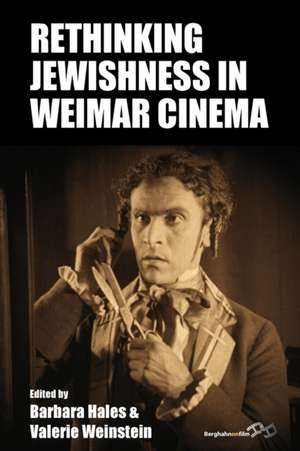Rethinking Jewishness in Weimar Cinema: Film Europa
Editat de Barbara Hales, Valerie Weinsteinen Limba Engleză Paperback – 9 mar 2023
| Toate formatele și edițiile | Preț | Express |
|---|---|---|
| Paperback (1) | 224.19 lei 3-5 săpt. | +21.92 lei 7-13 zile |
| BERGHAHN BOOKS – 9 mar 2023 | 224.19 lei 3-5 săpt. | +21.92 lei 7-13 zile |
| Hardback (1) | 835.18 lei 6-8 săpt. | |
| BERGHAHN BOOKS – noi 2020 | 835.18 lei 6-8 săpt. |
Din seria Film Europa
-
 Preț: 263.72 lei
Preț: 263.72 lei -
 Preț: 184.94 lei
Preț: 184.94 lei -
 Preț: 221.05 lei
Preț: 221.05 lei -
 Preț: 123.18 lei
Preț: 123.18 lei -
 Preț: 221.74 lei
Preț: 221.74 lei -
 Preț: 220.17 lei
Preț: 220.17 lei - 23%
 Preț: 1014.88 lei
Preț: 1014.88 lei -
 Preț: 303.11 lei
Preț: 303.11 lei -
 Preț: 260.27 lei
Preț: 260.27 lei - 23%
 Preț: 748.27 lei
Preț: 748.27 lei - 23%
 Preț: 747.99 lei
Preț: 747.99 lei -
 Preț: 263.20 lei
Preț: 263.20 lei - 23%
 Preț: 749.49 lei
Preț: 749.49 lei - 23%
 Preț: 805.51 lei
Preț: 805.51 lei -
 Preț: 258.50 lei
Preț: 258.50 lei -
 Preț: 257.69 lei
Preț: 257.69 lei - 23%
 Preț: 750.79 lei
Preț: 750.79 lei -
 Preț: 302.36 lei
Preț: 302.36 lei -
 Preț: 263.47 lei
Preț: 263.47 lei -
 Preț: 304.90 lei
Preț: 304.90 lei -
 Preț: 259.05 lei
Preț: 259.05 lei -
 Preț: 261.56 lei
Preț: 261.56 lei -
 Preț: 258.88 lei
Preț: 258.88 lei - 23%
 Preț: 749.49 lei
Preț: 749.49 lei -
 Preț: 260.02 lei
Preț: 260.02 lei - 23%
 Preț: 750.49 lei
Preț: 750.49 lei -
 Preț: 263.29 lei
Preț: 263.29 lei
Preț: 224.19 lei
Nou
Puncte Express: 336
Preț estimativ în valută:
42.90€ • 44.91$ • 35.50£
42.90€ • 44.91$ • 35.50£
Carte disponibilă
Livrare economică 15-29 martie
Livrare express 01-07 martie pentru 31.91 lei
Preluare comenzi: 021 569.72.76
Specificații
ISBN-13: 9781800739482
ISBN-10: 1800739486
Pagini: 366
Dimensiuni: 152 x 229 x 20 mm
Greutate: 0.5 kg
Editura: BERGHAHN BOOKS
Seria Film Europa
ISBN-10: 1800739486
Pagini: 366
Dimensiuni: 152 x 229 x 20 mm
Greutate: 0.5 kg
Editura: BERGHAHN BOOKS
Seria Film Europa
Notă biografică
Valerie Weinstein is Professor of Women's, Gender, and Sexuality Studies, Niehoff Professor in Film and Media Studies, and affiliate faculty in German Studies and Judaic Studies at the University of Cincinnati. She is the author of Antisemitism in Film Comedy in Nazi Germany (Indiana University Press, 2019) and numerous articles on Weimar and Nazi cinema. She is co-editor, with Barbara Hales and Mihaela Petrescu, of Continuity and Crisis in German Cinema 1928-1936 (Camden House, 2016).
Descriere
Descriere de la o altă ediție sau format:
The film industry in the Weimar Republic was a major site for German-Jewish experience that provided a sphere for Jewish "outsiders" to shape mainstream culture. The essays in this book offer new historical, theoretical, and methodological approaches to the significant involvement of Jewish people in Weimar cinema.
The film industry in the Weimar Republic was a major site for German-Jewish experience that provided a sphere for Jewish "outsiders" to shape mainstream culture. The essays in this book offer new historical, theoretical, and methodological approaches to the significant involvement of Jewish people in Weimar cinema.
